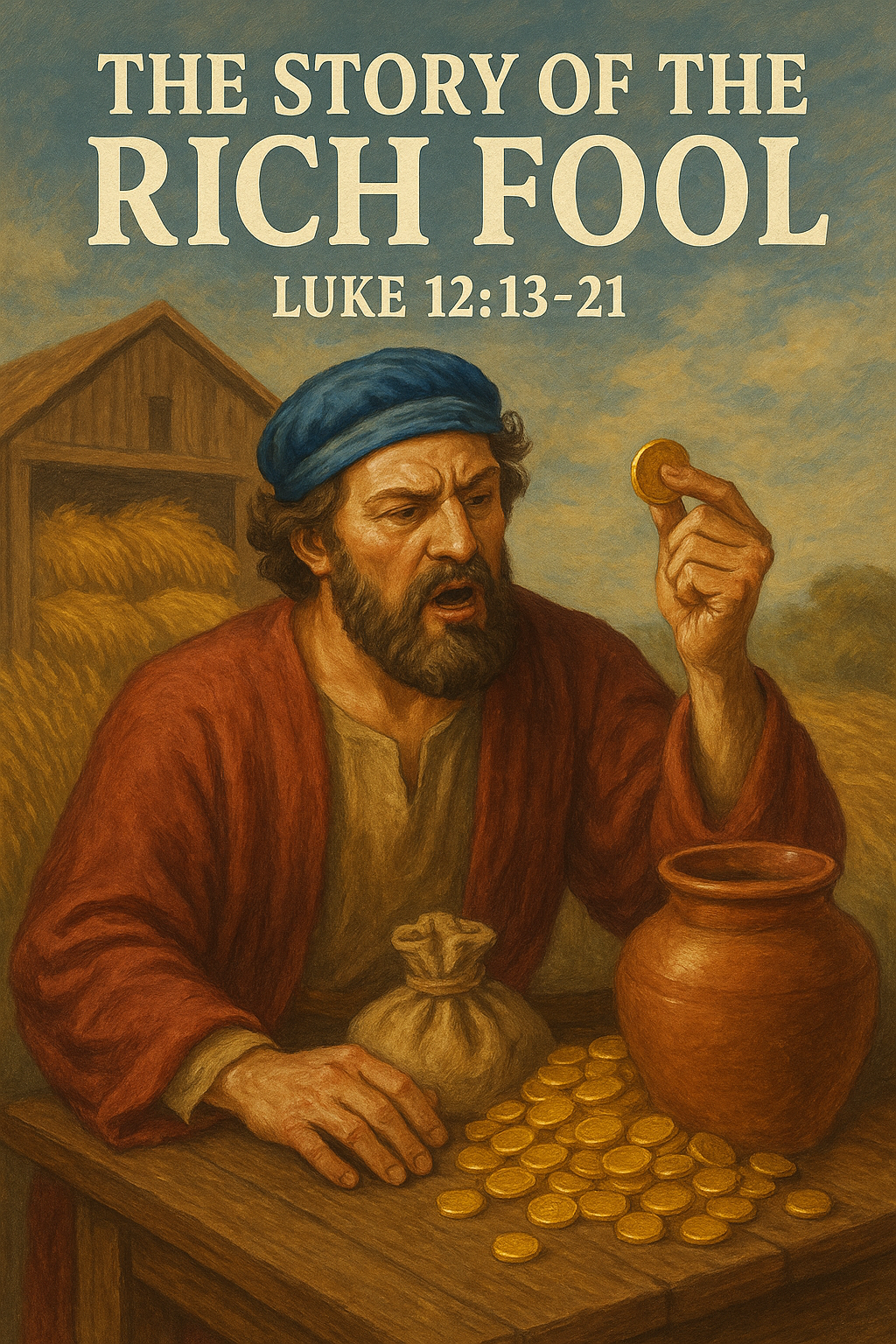
Have you ever found yourself dreaming of what you would do if you suddenly have lots of money? I have. It’s easy to imagine buying that dream house or finally taking that much-needed vacation. But what if our desire for wealth starts to cloud our judgment? Recently, I’ve been reflecting on the Lord Jesus’ parable of the rich fool. It made me rethink my priorities, especially when it comes to what I value most in this life. Today, let’s dive into the story of the rich fool verse by verse and explore what it teaches us about true riches and contentment.
Luke 12:13-21 “And one of the company said unto him, Master, speak to my brother, that he divide the inheritance with me. And he said unto him, Man, who made me a judge or a divider over you? And he said unto them, Take heed, and beware of covetousness: for a man’s life consisteth not in the abundance of the things which he possesseth. And he spake a parable unto them, saying, The ground of a certain rich man brought forth plentifully: And he thought within himself, saying, What shall I do, because I have no room where to bestow my fruits? And he said, This will I do: I will pull down my barns, and build greater; and there will I bestow all my fruits and my goods. And I will say to my soul, Soul, thou hast much goods laid up for many years; take thine ease, eat, drink, and be merry. But God said unto him, Thou fool, this night thy soul shall be required of thee: then whose shall those things be, which thou hast provided? So is he that layeth up treasure for himself, and is not rich toward God.”
The Parable of The Rich Fool
Verse 13: A Request for Justice?
“And one of the company said unto him, Master, speak to my brother, that he divide the inheritance with me” (Luke 12:13).
The story begins with a man asking Jesus to intervene in a dispute over inheritance. According to Deuteronomy 21:17, the firstborn son was entitled to a double portion of the family inheritance. The laws were clear, but disputes over wealth often bring out the worst in people. This man seemed more interested in what was due to him rather than in maintaining peace with his brother. Isn’t it striking how often possessions can divide families? Jesus could see that this was not merely about fairness but about the state of this man’s heart.
Verse 14: Jesus’ Refusal to Get Involved
“And he said unto him, Man, who made me a judge or a divider over you?” (Luke 12:14).
The Lord Jesus’ response might seem harsh at first glance, but it reveals something crucial about His mission. The Lord was not here to settle disputes over earthly wealth; He came to seek and save the lost (Luke 19:10). His refusal also pointed out the man’s misplaced focus. Instead of seeking righteousness or reconciliation, this man was fixated on material gain. How often do we approach God with our earthly desires, forgetting that He is more concerned with our eternal well-being?
Verse 15: The Danger of Covetousness
“And he said unto them, Take heed, and beware of covetousness: for a man’s life consisteth not in the abundance of the things which he possesseth” (Luke 12:15).
Here, the Lord Jesus issues a warning that goes beyond the man’s question and addresses everyone listening. Covetousness is a subtle and dangerous sin that can creep into our hearts unnoticed. The Lord emphasizes that life is not measured by how much we own. In this age, where social media flaunts material success, it’s easy to fall into the trap of measuring our worth by our possessions. But the Lord is clear—our value does not come from the abundance of things we have in this world, but how much we possess Christ.
Verses 16–17: A Problem of Abundance
“And he spake a parable unto them, saying, The ground of a certain rich man brought forth plentifully: And he thought within himself, saying, What shall I do, because I have no room where to bestow my fruits?” (Luke 12:16–17).
The rich man’s land was extraordinarily productive, but instead of seeing it as an opportunity to bless others, he viewed it as a logistical issue. “What shall I do?” he pondered. His problem was not one of scarcity but of surplus. It’s interesting to see how a blessing can turn into a problem if our perspective is self-centered. His first instinct was to hoard, rather than to share. We need to ask ourselves: How do we respond when we experience an abundance? Do we see it as a chance to glorify God and help others, or do we immediately think of ways to keep it all for ourselves?
Verses 18–19: A Foolproof Plan for Comfort?
“And he said, This will I do: I will pull down my barns, and build greater; and there will I bestow all my fruits and my goods. And I will say to my soul, Soul, thou hast much goods laid up for many years; take thine ease, eat, drink, and be merry” (Luke 12:18–19).
The rich man’s solution was to tear down his barns and build bigger ones to store his crops. He thought he had it all figured out—“take thine ease, eat, drink, and be merry.” His focus was entirely on his comfort and his future security. But there was a critical flaw in his plan: he put God out of the equation. This is the attitude Paul speaks of in 1 Corinthians 15:32, “If the dead rise not? let us eat and drink; for to morrow we die.” Without a heavenly perspective, all we’re left with is momentary pleasure. But Jesus reminds us in Matthew 6:19–21 to lay up treasures in heaven, where they cannot be destroyed.
Verse 20: The Sudden Reality of Mortality
“But God said unto him, Thou fool, this night thy soul shall be required of thee: then whose shall those things be, which thou hast provided?” (Luke 12:20).
God calls the rich man a fool—not because he was rich, but because he was shortsighted. He planned for everything except the one thing that mattered most: eternity. He thought he had many years to enjoy his wealth, but his life was required of him that very night. James 4:14 says, “Whereas ye know not what shall be on the morrow. For what is your life? It is even a vapour, that appeareth for a little time, and then vanisheth away.” We must not be fooled into thinking we have time to get right with God or to serve Him later. The time is now.
Verse 21: True Riches
“So is he that layeth up treasure for himself, and is not rich toward God” (Luke 12:21).
The parable ends with a sobering truth: those who lay up treasure for themselves but are not rich toward God are foolish. The Lord Jesus isn’t condemning wealth itself; rather, He warns us against making it our ultimate goal. To be “rich toward God” means to invest in what is eternal—our relationship with Him, the lives of others, and the work of His kingdom. It’s about aligning our priorities with His.
Practical Application: Being Rich Toward God
So, how do we become rich toward God? Here are some practical steps:
1. Cultivate Contentment: Paul writes in 1 Timothy 6:6, “But godliness with contentment is great gain.” True wealth lies in being content with what God has given us, recognizing that He is the ultimate provider.
2. Give Generously: When God blesses us, it’s not just for our benefit. We are called to share with those in need. Proverbs 11:25 says, “The liberal soul shall be made fat: and he that watereth shall be watered also himself.”
3. Invest in Eternal Things: The Lord Jesus urges us in Matthew 6:20, “But lay up for yourselves treasures in heaven.” Spend your time, energy, and resources in things that have eternal value—like supporting ministries, helping others, and sharing the gospel.
Call to Action: Seek First the Kingdom
I want to challenge you today: Where is your treasure? Are you storing up wealth for yourself, or are you investing in God’s kingdom? Let’s be mindful of where our true riches lie. The Lord Jesus said in Matthew 6:33, “But seek ye first the kingdom of God, and his righteousness; and all these things shall be added unto you.” Make Him your priority, and trust that He will take care of your needs. Let’s not be like the rich fool, consumed by our possessions and plans. Instead, let’s live with eternity in view, being rich toward God and storing up treasures in heaven.
![]()




More Stories
THE PREHISTORIC EARTH
HE SAT WITH ME WHILE I WAS BROKEN
YOU WERE CHOSEN IN THE DARK